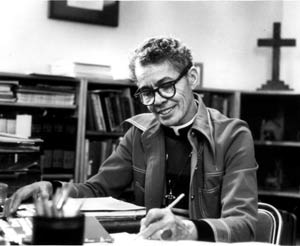Readings:
Isaiah 55:10-13
Psalm 119:17-24
Galatians 3:23-29
Mark 12:1-12
Preface of a Saint (1)
[Common of a Pastor]
[Common of a Prophetic Witness]
[For the Ministry]
[For Prophetic Witness in the Church]
PRAYER (traditional language)
Liberating God, we give thee thanks for the steadfast courage of thy servant Pauli Murray, who didst fight long and well: Unshackle us from the chains of prejudice and fear, that we may show forth the reconciling love and true freedom which thou didst reveal in thy Son our Savior Jesus Christ; who liveth and reigneth with thee and the Holy
Ghost, one God, now and for ever. Amen.
PRAYER (contemporary language)
Liberating God, we thank you for the steadfast courage of your servant Pauli Murray, who fought long and well: Unshackle us from chains of prejudice and fear, that we may show forth the reconciling love and true freedom which you revealed in your Son our Savior Jesus Christ; who lives and reigns with you and the Holy Spirit, one God, now and for ever. Amen.
Lessons revised at General Convention 2024.
Return to Lectionary Home Page
Webmaster: Charles Wohlers
Last updated: 9 July 2024
PAULI MURRAY
PRIEST (1 July 1985)
 Anna Pauline "Pauli" Murray (November 20, 1910 – July 1, 1985) was an American civil rights activist, women's rights activist, lawyer, and author. Drawn to the ministry, in 1977 Murray became the first black woman to be ordained as an Episcopal priest and among the first group of women to become priests in this church.
Anna Pauline "Pauli" Murray (November 20, 1910 – July 1, 1985) was an American civil rights activist, women's rights activist, lawyer, and author. Drawn to the ministry, in 1977 Murray became the first black woman to be ordained as an Episcopal priest and among the first group of women to become priests in this church.
Born in Baltimore, Maryland, Murray was raised mostly by her maternal grandparents in Durham, North Carolina. At the age of sixteen, she moved to New York to attend Hunter College, graduating with a Bachelor of Arts degree in English in 1933. In 1940, Murray sat in the whites-only section of a Virginia bus with a friend, and they were arrested for violating state segregation laws. This incident, and her subsequent involvement with the socialist Workers' Defense League, led to a career goal as a civil rights lawyer. She enrolled in the law school of Howard University, where she graduated first in her class, but was denied the chance to do post-graduate work at Harvard University because of her gender. She earned a master's in law at University of California, Berkeley, and in 1965 she became the first African American to receive a Doctor of Juridical Science degree from Yale Law School.
As a lawyer, Murray argued for civil rights and women's rights. National Association for the Advancement of Colored People (NAACP) Chief Counsel Thurgood Marshall called Murray's 1950 book States' Laws on Race and Color the "bible" of the civil rights movement. Murray served on the 1961 Presidential Commission on the Status of Women and in 1966 was a co-founder of the National Organization for Women. Murray held faculty or administrative positions at the Ghana School of Law, Benedict College, and Brandeis University.
In 1973, Murray left academia for the Episcopal Church, becoming an ordained priest on January 8, 1977, among the first generation of women priests.
- more at Wikipedia